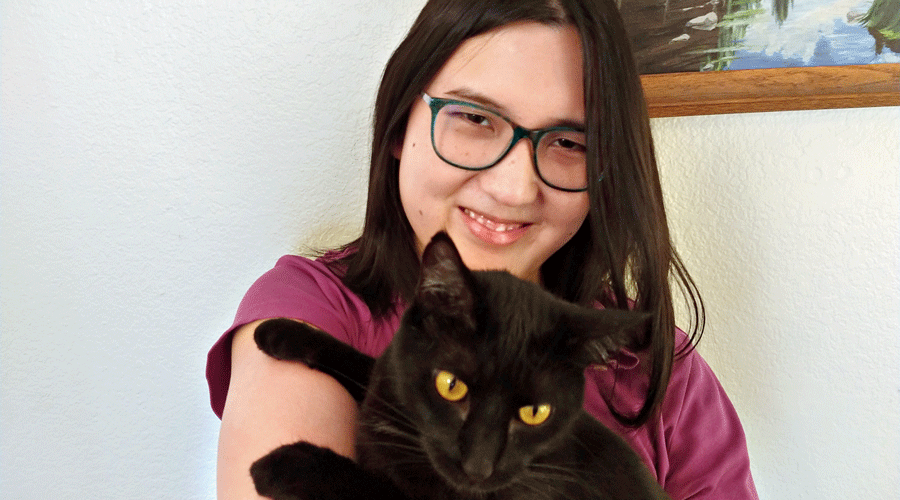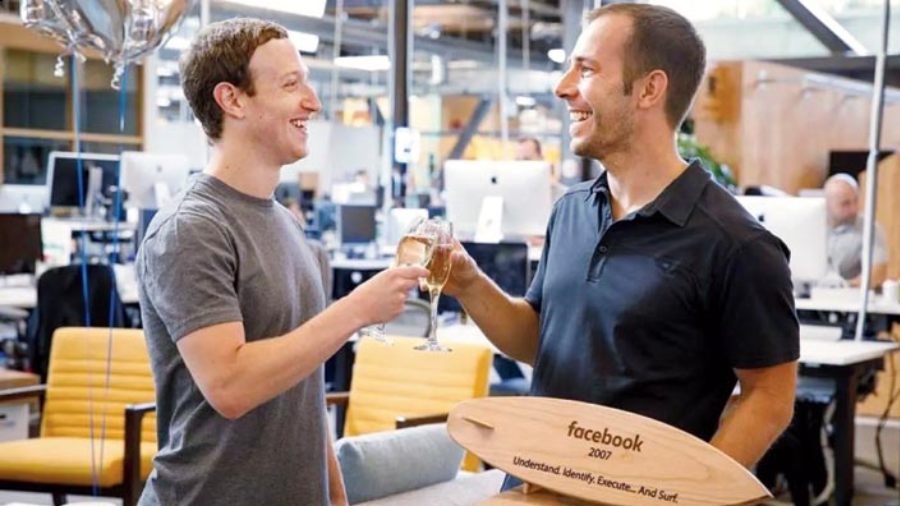Facebook whistleblower Sophie Zhang, who had offered to testify before a parliamentary panel last year about the platform’s alleged pro-BJP bias, has revealed the social media giant ignored her recommendations for action against inauthentic accounts linked to party MP Vinod Sonkar in 2019 and 2020.
Inauthentic Facebook accounts are those operated by users who are not the entities the accounts purport to represent. Operating them is not illegal but considered unethical as the practice drowns out the voices of real users. Zhang was a data scientist in a team that identified and recommended action against such accounts for almost three years until September 4, 2020, when she quit.
Purported copies of internal communications she has shared with select publications, including The Telegraph, describe five networks of inauthentic accounts: two pro-BJP, two pro-Congress, and one pro-Aam Aadmi Party (AAP).
One of these she found to be directly linked to Sonkar, who ironically chairs the parliamentary standing committee on ethics. She has now shared with the select publications redacted copies of documents she had shared with the parliamentary standing committee on communications and information technology via email on November 5, 2021.
“There were 50-60 inauthentic accounts being used to promote and amplify the content of MP Vinod Sonkar (BJP MP from Kaushambi, Uttar Pradesh),” Zhang said.
“The number is imprecise as they varied by the day. These inauthentic accounts were linked to the personal account and network of MP Sonkar, indicating that either the MP himself was involved, or it was someone very close to him trusted with such access.”
She added: “Note that 50 to 60 inauthentic accounts is a very small number. I would frankly have not considered it worth mentioning except for the direct connection to the sitting MP and for FB’s deeply unusual reaction afterwards in which they refused to act despite already having approved a takedown.”
Sonkar, BJP national secretary in charge of Tripura, is currently travelling in the northeastern state and did not respond to calls, texts or emails from this newspaper.
Meta, the firm that owns Facebook, responded to the allegations in an email to this newspaper.
“We have not been provided the documents and cannot speak to the specific assertions, but we have stated previously that we fundamentally disagree with Ms Zhang’s characterisation of our priorities and efforts to root out abuse on our platform,” a spokesperson wrote.
“We aggressively go after abuse around the world and have specialised teams focused on this work. As a result, we’ve already taken down more than 150 networks of coordinated inauthentic behaviour. Around half of them were domestic networks that operated
in countries around the world, including those in India.”
In 2020, Facebook’s India public policy head Ankhi Das had quit after The Wall Street Journal reported she had opposed action against hate speech by BJP legislators. In March this year, The Reporters Collective — which describes itself as “a collective of like-minded journalists” who “report on stories that put the spotlight on those in power” — analysed ad data to find that Facebook had charged the BJP less than other parties for political ads.
On the accusation of inaction on the Sonkar cluster, the Meta spokesperson said: “This is a completely wrong and misleading assertion and reflects a limited understanding of how we enforce our policies…. The process comes with robust checks and balances built in to ensure that the policies are implemented as they are intended to be and take into consideration applicable local laws. We strive to apply our policies uniformly without regard to anyone’s political positions or party affiliations.”
On November 1, 2021, Congress MP Shashi Tharoor, who is chairman of Parliament’s communications and IT committee, had tweeted that he had sought permission — as required for foreign witnesses — from Lok Sabha speaker Om Birla to allow Zhang to depose.
Shivnath Thukral, public policy director of Meta-owned WhatsApp in India, deposed on behalf of Facebook to the committee on November 29, 2021. The Speaker has not yet responded to the panel’s request on Zhang, which has prompted her to make her documentation public.
Tharoor and Birla did not respond to queries from this newspaper on Zhang. Panel member Jawhar Sircar of Trinamul told this newspaper: “We had questioned Thukral and he summarily dismissed the disclosures made by Zhang. We were and are still keen to take her evidence as she has revealed very critical information and data that may have helped the committee give specific recommendations to the government to check the misuse of social media.”
Zhang’s documentation shows that Thukral had approved action against fake clusters linked to three Congress MLAs in Punjab in 2020.
She said: “The same level of evidence was more than sufficient for Shivnath Thukral to personally approve action against the employees of multiple Punjab Congress MLAs.
“In the case of MP Sonkar, the fake accounts were tied directly to the personal account of the MP, indicating someone with personal access to the MP’s account was running these fake accounts…. In the case of the Congress MLAs, the fake accounts were tied to the personal accounts of their page administrators — their employees (or someone with access to those accounts).”
None of the three Congress MLAs — Arun Dogra, Balwinder Singh Laddi and Sunder Sham Arora — were re-elected this year. Laddi and Arora have since joined the BJP.
Zhang said: “I also did not verify my findings regarding the Congress MLAs (Shivnath Thukral ordered action several days before I had the chance), whereas I did verify extensively my findings regarding MP Sonkar. And of course, FB quickly took down the inauthentic accounts associated with the Congress MLAs — including the accounts of their employees temporarily — while ignoring the inauthentic accounts associated with MP Sonkar’s account.”
A pro-BJP cluster of 65 accounts and a pro-Congress cluster of 51 accounts, neither linked to any eminent person, had been discovered in September and October 2019 and taken down on December 19, 2019. The Punjab Congress cluster of 526 accounts was also discovered and taken down in the same period.
A pro-AAP network was discovered on January 19, 2020. It later showed a peculiar activity of supporting the AAP in Delhi and the Congress in Punjab. In total, 1,090 accounts of this network were taken down in February 2020 — the month the AAP was re-elected in the Delhi Assembly polls — for which Zhang says she faced resistance from her colleagues.
Zhang’s screenshots of her task sheet show that the Sonkar cluster was discovered on December 10, 2019, and that she gave five reminders to take it down until February 3, 2020. She said she was asked to put in her papers in August that year “due to poor performance”.
Ankit Lal, who was the AAP’s social media and IT head at the time, told this newspaper: “Post 2014 Lok Sabha results, there was a visible shift in the way Facebook talked to political organisations other than the BJP. While Vinod Sonkar is one example, similar clusters run by other members of the ruling establishment have been running amok, spreading hate. What has been brought to the public domain is just the tip of the iceberg.”
The Sonkar cluster has not been found to promote hate speech but was used merely to publicise his work.
“In my opinion, all the data in this regard, be it the accounts affiliated to the BJP or the Congress or the AAP or any other party, needs to be made public. Unless that happens, and a proper scrutiny by experts takes place, we can’t be sure about anything,” Lal, who is now a private consultant, added.
He explained: “In the case of the same accounts supporting multiple parties, we need to get into the nuances of the political affiliations. First of all, not all accounts active on political issues are fake/ bot accounts. Running bot accounts is a very cost-intensive exercise and not all parties have the required infrastructure.
“Secondly, political parties as well as non-political organisations and individuals create a network of their supporters. In the case of non-affiliated organisations, their affiliation does not lie with any party but with some ideology that the organisation might be adhering to.
“These organisations or individuals give support on a case-to-case basis. So, I would not be surprised if these accounts belong to some organisation that put its weight behind the Congress in Punjab and the AAP in Delhi. However, such a phenomenon is seen primarily during the Lok Sabha elections and not during state elections.
“There are vendors who provide services like retweets, shares, etc, to any organisation that is willing to pay. Their activity is not limited to political organisations. So, a bot account might be selling a soap one day, giving out ‘gyan’ on a political issue the next day and giving ‘movie reviews’ on the third day…. To add to this, in the case of political organisations, as with corporate (entities), the senior leadership may not even be aware as this kind of thing is generally handled by mid-level managers.”
Internal Facebook memos that its former data scientist Frances Haugen revealed to the US stock market regulator in September last year show that the company went easy on hate speech, including anti-Muslim content in India from pages that supported the RSS.
Zhang told the British Parliament last October that Facebook was “allowing authoritarian governments to manipulate political discourse”.
Her revelations indicate that not just hate speech but the use of fake accounts or trolls by political parties has led to political turmoil, loss of life and harassment in Azerbaijan, Honduras, Bolivia, Ecuador and several other countries.
The California-based Zhang had refused a severance package from Facebook that came with a non-disclosure pact, and has been unemployed since she quit. However, she said she doesn’t take any payment for speaking at events as she doesn’t want to benefit from these disclosures.












